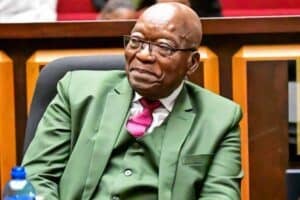Their economic record beats anything that came before or after.

If we are to measure our political leaders on economic performance alone, Thabo Mbeki was our best president in the last 30 years, and Trevor Manuel our best finance minister.
As the accompanying graph shows, President Jacob Zuma has been bad for growth, but arguably better than FW De Klerk, who had to contend with the tail end of apartheid and international sanctions – which deprived SA of the capital it needed for growth and investment.
President Nelson Mandela had a mixed performance, with economic growth veering between -2% and +2%, for many of the same reasons confronted by De Klerk. Foreign investors remained wary of SA’s democratic experiment, as shown by the sluggish growth in foreign direct investment (FDI), until Mandela ventured overseas and exercised his considerable charm in enticing investors to these shores. But it was Mbeki who reaped the benefit of Mandela’s international outreach. Under President Zuma, FDI growth has come to a virtual stall.
Mbeki delivered the most consistent economic growth – admittedly helped by a commodity boom which ended abruptly as his term of office came to a close in 2008 – and Trevor Manuel as finance minister for 13 years, until 2009 delivered the lowest budget deficits. Manuel’s steady hand on the fiscus was likewise aided by the aforementioned commodity boom, which fattened tax receipts and reduced the need for large budget deficits.
Unemployment and inequality
Of course, no president can be measured on economic growth alone, so perhaps we should throw a few other measures into the pot, such as the rate of unemployment and income inequality.
On unemployment, Mbeki again shines, presiding over a drop from more than 30% to 22% during his tenure. He didn’t do so well on income inequality, which increased during his presidency, but this is an inevitable consequence of the economic boom years when income disparities tend to increase.
Looked at as a whole, ANC politicians have outperformed their National Party (Nats) predecessors, unless you go back to the 1970s when economic growth exceeded 6% for several years, lofted by a surge in the gold price.
Of course none of these measures account for the positive and sweeping political changes ushered in by De Klerk and Mandela. They undoubtedly laid the groundwork for the strong economic performance that followed, and for which Mbeki could take the credit.
On paper, Derek Keys – a former chairman of Gencor before being co-opted by De Klerk to his cabinet – was a terrible finance minister for signing off on a budget deficit of around 7% in 1992. This, however, was the cost of a peaceful political transition as the Nats made sure civil servants were richly pensioned in the dying years of apartheid. Keys was the only finance minister to serve under both De Klerk and Mandela, albeit briefly. Chris Liebenberg was then seconded from Nedbank to serve under Mandela, who wanted to demonstrate to the world that for all his avowed communist sympathies, he was leaving the country’s purse strings in the hands of a trusted banker.
Trevor Manuel took over the finance ministry in April 1996 and proved himself up to the task, despite his lack of experience. He reduced the budget deficit from around 4% to zero over the next decade. He resigned in 2008 when Mbeki was dethroned as leader of the ANC, though he served briefly under interim President Kgalema Motlanthe in 2009. He was rewarded for his efforts with postings at the World Bank and, more recently, Old Mutual.
The performance of the rand under Zuma reflects the disquiet of business decision makers. After the sacking of finance minister Nhlanhla Nene in late 2015, the currency sank briefly to R17 to the US dollar, before steadying again as Pravin Gordhan was announced as his replacement. Gordhan was handed a poisoned chalice in the form of a slowing economy (and hence tax receipts) from which he has to service a gargantuan public sector wage bill and welfare payments. He has managed to keep the deficit at around 4%, which is no small achievement for an economy growing at slightly above 1%.
In purely economic terms, Zuma is by no means the worst president we have had to endure. This, of course, is a limited view. If we take into account the fact that SA businesses continue to move capital abroad at record rates – about R70 billion on a rolling cumulative basis last year – this tells us something about the state of governance in the country. Another blot on the Zuma record is the lingering threat of a credit downgrade. None of this is reflected in the accompanying graphs. Nor the fact that he has stacked key ministries and State-owned enterprises with loyalists.
There are many in SA who look back with nostalgia on Mbeki’s presidency, including many in the ANC who helped engineer his regicide.
Based on the economic record, this nostalgia is entirely justified.
Brought to you by Money Web
For more news your way, follow The Citizen on Facebook and Twitter.










